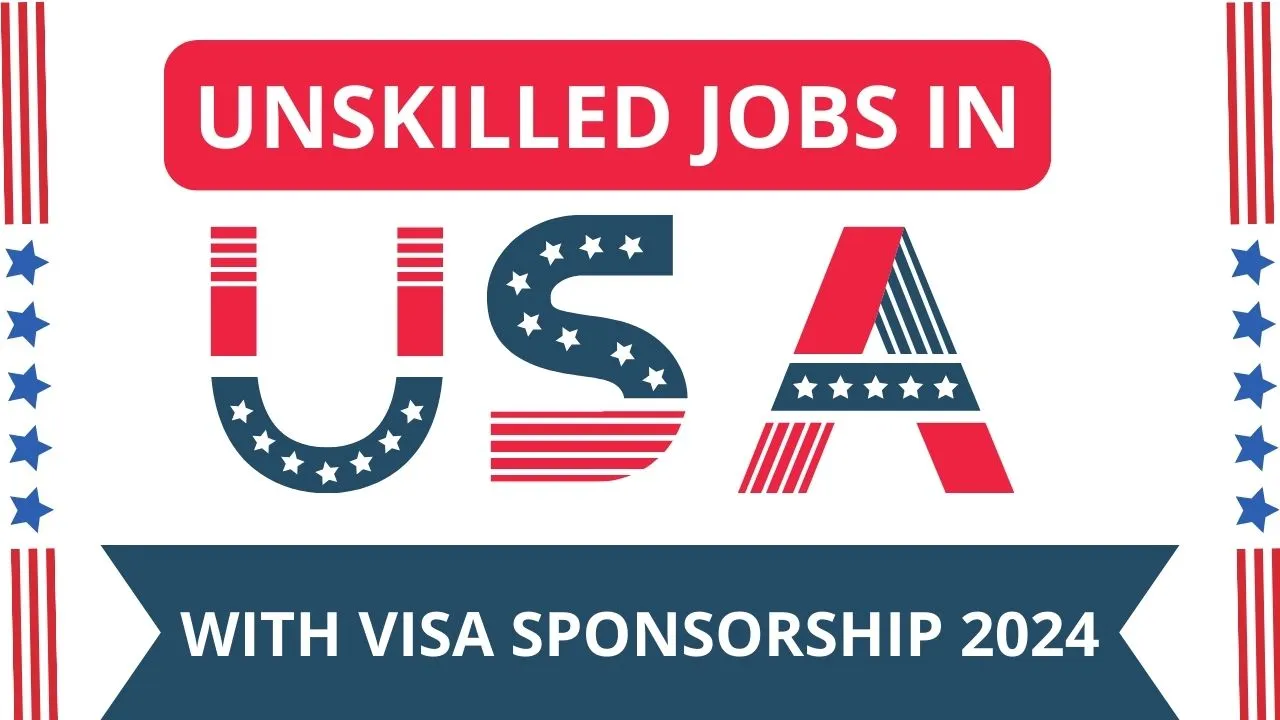Finding a job in the United States can be challenging, especially for those without specialized skills or higher education. However, for those seeking opportunities in unskilled positions, there are still pathways available through visa sponsorship. This article explores these job opportunities, the types of visas available, and how to navigate the process.
Understanding Unskilled Jobs
Unskilled jobs typically require minimal formal education or specific skills. These positions often involve routine tasks that can be learned on the job. Examples include roles in agriculture, hospitality, construction, and manufacturing. While these jobs may not require specialized training, they are essential to many industries and offer pathways for employment in the U.S.
Types of Unskilled Jobs in the U.S.
1. Agricultural Work
Agricultural jobs are a significant sector for unskilled workers. These roles can include planting, harvesting, and processing crops. Positions may be available in various types of farming, including fruit and vegetable picking, dairy farming, and livestock care. Seasonal work is common, particularly during peak harvesting periods.
2. Hospitality and Service Industry
The hospitality sector offers numerous unskilled job opportunities. These roles might include positions in hotels, restaurants, and other service-related businesses. Common jobs include housekeeping, dishwashing, and general maintenance. These positions often require customer service skills but no formal education.
3. Construction
Construction is another field where unskilled labor is crucial. Jobs in this sector might involve general labor, site cleanup, or assisting skilled tradespeople. While some construction jobs may offer on-the-job training, they generally do not require specialized prior experience.
4. Manufacturing and Warehousing
Manufacturing and warehousing jobs often involve assembly line work, packaging, and inventory management. These roles are essential to keeping production lines running smoothly and ensuring products are shipped on time.
Visa Sponsorship for Unskilled Jobs
For non-U.S. citizens seeking unskilled jobs, visa sponsorship is required. Several types of visas can be used for this purpose:
1. H-2A Visa (Agricultural Workers)
The H-2A visa allows U.S. employers to hire foreign workers for seasonal agricultural work. To qualify, employers must demonstrate that there are not enough local workers to fill the positions. The H-2A visa is typically used for roles such as planting, harvesting, and general farm labor.
2. H-2B Visa (Non-Agricultural Seasonal Workers)
The H-2B visa is used for non-agricultural, seasonal, or temporary work. This includes roles in hospitality, construction, and other industries where there is a temporary need for additional labor. Like the H-2A visa, employers must prove that local workers are unavailable.
3. J-1 Visa (Exchange Visitors)
The J-1 visa is designed for exchange visitors and can sometimes be used for unskilled positions, particularly in hospitality and cultural exchange programs. This visa is often associated with internships and training programs but can also cover seasonal work.
4. O-1 Visa (Individuals with Extraordinary Ability)
Although the O-1 visa is typically for individuals with extraordinary ability or achievement, some employers might seek to sponsor workers who demonstrate exceptional skills or talents, even in less specialized roles. This visa is less common for unskilled work but worth noting for specific cases.
How to Apply for a Visa
1. Find a Job
The first step is to secure a job offer from a U.S. employer willing to sponsor your visa. This typically involves searching for job openings through online job boards, recruitment agencies, or direct inquiries with potential employers.
2. Employer’s Role
The employer must submit a petition to the U.S. Citizenship and Immigration Services (USCIS) on your behalf. This includes providing evidence of the need for foreign workers and showing that no local workers are available for the job.
3. Visa Application
Once the petition is approved, you can apply for the visa at a U.S. embassy or consulate in your home country. This involves completing the necessary forms, attending an interview, and providing required documentation.
4. Travel to the U.S.
After your visa is approved, you can travel to the U.S. and begin your employment. Ensure you comply with all visa conditions and maintain your status throughout your stay.
Challenges and Considerations
1. Visa Limits
Some visa categories, such as the H-2B, have annual caps on the number of visas issued. This can make obtaining a visa competitive, especially in peak seasons.
2. Job Stability
Unskilled jobs may be more susceptible to fluctuations in demand, which can affect job stability. It’s important to understand the nature of the work and the employer’s needs.
3. Work Conditions
Unskilled jobs can vary widely in terms of working conditions and wages. Researching potential employers and understanding the job’s requirements and conditions is crucial.
4. Legal and Compliance Issues
Ensure that your employer adheres to all legal requirements related to visa sponsorship and labor laws. This includes fair wages, working hours, and safety regulations.
Tips for Success
1. Research Thoroughly
Before applying, research the type of job and the employer thoroughly. Understanding the role and the work environment can help you make an informed decision.
2. Prepare Documentation
Ensure you have all necessary documentation ready for your visa application. This includes proof of job offer, evidence of employer’s need for foreign workers, and personal identification documents.
3. Stay Informed
Immigration policies and visa regulations can change. Stay updated on current requirements and procedures to ensure a smooth application process.
4. Seek Professional Help
Consider consulting an immigration lawyer or advisor to guide you through the visa application process. Professional assistance can help avoid common pitfalls and ensure compliance with all regulations.
Conclusion
Unskilled jobs in the United States provide valuable opportunities for those without specialized skills or higher education. Through visa sponsorship programs like the H-2A, H-2B, and J-1 visas, international workers can access these roles and gain experience in the U.S. job market. While challenges exist, careful research, preparation, and understanding of the visa process can help navigate these opportunities successfully.



